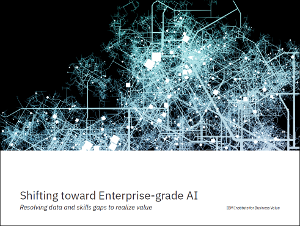Ungated Post | 02 Oct 2018
Shifting toward Enterprise-grade AI

Artificial intelligence (AI) is moving beyond the hype cycle, as more and more organizations seek to adopt AI-related technologies. These organizations are focusing on prioritizing functional areas and use cases, placing a stronger emphasis on topline growth, taking up a renewed interest in their data infrastructure and articulating greater unease about the skills of their knowledge workers. This report explores how they are approaching strategic imperatives, defining value drivers, building foundational capabilities and improving access to talent — as well as how their efforts could drive exponential competitive advantage.
The IBM Institute for Business Value Benchmarking Program worked with Oxford Economics to survey C-level executives and top functional leaders about AI and cognitive computing. Based on insights from more than 5,000 global executives, this report explores how organizational views on AI have evolved over the last two years, specifically in four key areas:
1) Sharper focus on AI
2) Heightened emphasis on topline growth
3) Growing importance of data
4) Intensified concern about skills
Our Thought Leadership team produces original, evidence-based research made accessible to decision-makers and opinion leaders.
Oxford Economics’ team is expert at applying advanced economic tools that provide valuable insights into today’s most pressing business, financial, and policy issues.
Related Services

Post
KPMG M&A Outlook 2026: Between Uncertainty, Resilience, and Seizing Opportunities
Discover how Germany’s M&A landscape is evolving – with a focus on growth, AI and post-merger value creation.
Find Out More
Post
Silver, the next generation metal
This report highlights the critical role silver plays in data centres and artificial intelligence (AI), automotive and electric vehicles (EVs), and solar energy photovoltaics (PVs). With these sectors expected to expand significantly over the coming years, we expect future silver demand to be strong.
Find Out More
Post
Powering the UK Data Boom: The Nuclear Solution to the UK’s Data Centre Energy Crunch
The UK’s data centre sector is expanding rapidly as digitalisation, cloud computing, and artificial intelligence (AI) drive surging demand for high-performance computing infrastructure.
Find Out More